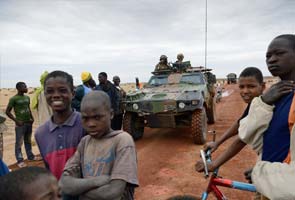
After taking control of the key cities of northern Mali, forcing the Islamic rebels to retreat into the desert, the French military intervention is turning away from the cities and targeting the fighters' remote outposts to prevent them bases from being used as Saharan launch pads for international terrorism.
The French plan to leave the city of Timbuktu on Thursday, February 7, a spokeswoman for the armed forces in the city said Monday. French soldiers took the city last week after Islamic extremists withdrew. Now the French military said it intends to move out of Timbuktu in order to push farther northeast to the strategic city of Gao.
On Monday, French troops in armored personnel carriers were still patrolling Timbuktu. In the city's military camps, newly arrived Malian troops were cleaning their weapons Monday and holding meetings to prepare to take over the security of the city once the French leave.
There are signs that the Islamic rebels are beginning a guerrilla-type of conflict from their desert retreats as land mine explosions have killed four Malian soldiers and two civilians throughout the northern region in recent days.
The two civilians died in an explosion from a land mine, or an improvised explosive device, on the road in northeastern Mali that links Kidal, Anefis and North Darane, the United Nations Office for the Coordination of Humanitarian Affairs said in a statement Monday.
Four soldiers were killed last week by a land mine explosion in the northeast area near Gossi. The French reported that two other land mines have been found in that vicinity, and early Monday they detonated one of the mines.
French airstrikes targeted the Islamic extremists' desert bases and fuel depots in northern Mali overnight.
French Foreign Minister Laurent Fabius said on France-Inter radio Monday that the strikes hit the Kidal region, near the border with Algeria, for the second night in a row. The extremists "cannot stay there a long time unless they have ways to get new supplies," he said.
French Mirage and Rafale planes also pounded extremist training camps as well as arms and fuel depots from Saturday night into the early hours of Sunday, north of the town of Kidal and in the Tessalit region.
The French intervened in Mali on January 11 to stem the advance of the al Qaeda-linked fighters, who had taken over the country's north, enforced harsh rules on the population and plotted a terrorist attack in neighboring Algeria.
The French troops arrived when the Islamic extremists threatened to move farther south.
After pushing extremists out of key northern cities, France is now pushing to hand over control of those sites to African forces from a United Nations-authorized force made up of thousands of troops from nearby countries.
"In the cities that we are holding we want to be quickly replaced by the African forces," Fabius said on Monday.
Asked whether the French could pull out of the fabled city of Timbuktu and hand it to African forces as soon as Tuesday, Fabius responded, "Yes, it could happen very fast. We are working on it because our vocation is not to stay in the long term."
But it is far from clear that the African forces - much less the weak Malian army -are ready for the withdrawal of thousands of French troops, fighter planes and helicopters which would give the Africans full responsibility against the Islamic extremists, who may strike the cities from their desert hideouts.
No comments:
Post a Comment